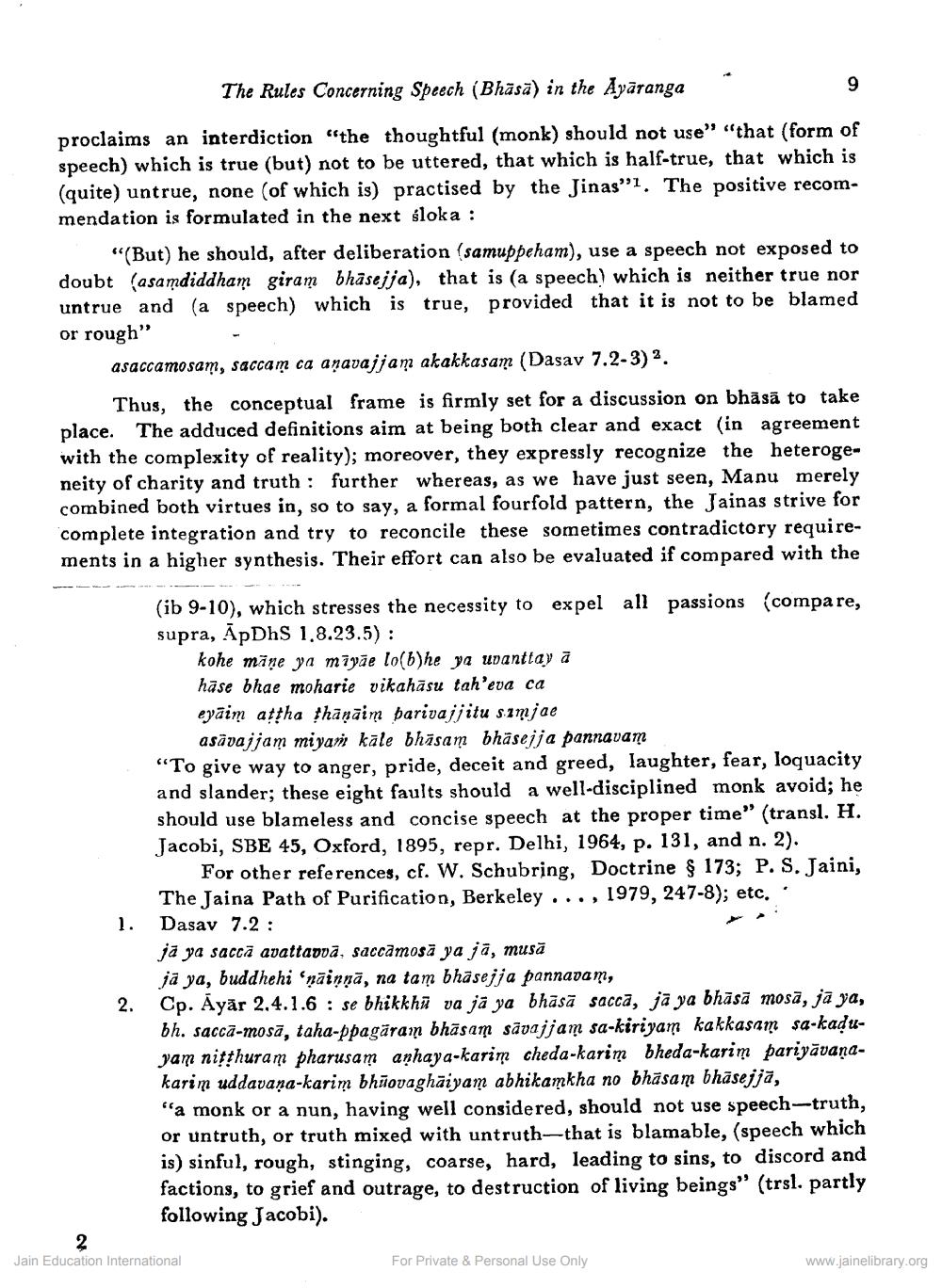________________
The Rules Concerning Speech (Bhāsā) in the Ayāranga
proclaims an interdiction "the thoughtful (monk) should not use" "that (form of speech) which is true (but) not to be uttered, that which is half-true, that which is (quite) untrue, none of which is) practised by the Jinas”). The positive recommendation is formulated in the next sloka :
"(But) he should, after deliberation (samuppeham), use a speech not exposed to doubt (asamdiddham giram bhāsejja), that is (a speech) which is neither true nor untrue and (a speech) which is true, provided that it is not to be blamed or rough"
asaccamosam, saccam ca anavajjam akakkasam (Dasav 7.2-3) 2.
Thus, the conceptual frame is firmly set for a discussion on bhāsā to take place. The adduced definitions aim at being both clear and exact (in agreement with the complexity of reality); moreover, they expressly recognize the heterogeneity of charity and truth: further whereas, as we have just seen, Manu merely combined both virtues in, so to say, a formal fourfold pattern, the Jainas strive for complete integration and try to reconcile these sometimes contradictory requirements in a higher synthesis. Their effort can also be evaluated if compared with the
(ib 9-10), which stresses the necessity to expel all passions (compare, supra, ApDhS 1.8.23.5):
kohe māne ya mīyāe lo(b)he ya upanttay a hāse bhae moharie vikahāsu tah'eva ca eyāim attha thàņāim parivajjitu simjae
asāvajjam miyam kale bhāsam bhäsejja pannavam "To give way to anger, pride, deceit and greed, laughter, fear, loquacity and slander; these eight faults should a well-disciplined monk avoid; he should use blameless and concise speech at the proper time" (transl. H. Jacobi, SBE 45, Oxford, 1895, repr. Delhi, 1964, p. 131, and n. 2).
For other references, cf. W. Schubring, Doctrine § 173; P. S. Jaini, The Jaina Path of Purification, Berkeley ..., 1979, 247-8); etc.. Dasav 7.2 : ja ya saccă avattadvā, saccāmosa ya jā, musă ja ya, buddhehi 'ņāinnā, na tam bhāsejja pannavam, Cp. Ayar 2.4.1.6 : se bhikkhū va jā ya bhāsā saccā, jā ya bhāsā mosā, ja ya, bh. saccā-mosā, taha-ppagārain bhāsam sãvajjam sa-kiriyam kakkasam sa-kaduyam nisthuram pharusam anhaya-karim cheda-karim bheda-karim pariyāvanakarim uddavana-karim bhūovaghāiyam abhikamkha no bhāsam bhāsejjā, "a monk or a nun, having well considered, should not use speech-truth, or untruth, or truth mixed with untruth-that is blamable, (speech which is) sinful, rough, stinging, coarse, hard, leading to sins, to discord and factions, to grief and outrage, to destruction of living beings" (trsl. partly following Jacobi).
2.
Jain Education International
For Private & Personal Use Only
www.jainelibrary.org




